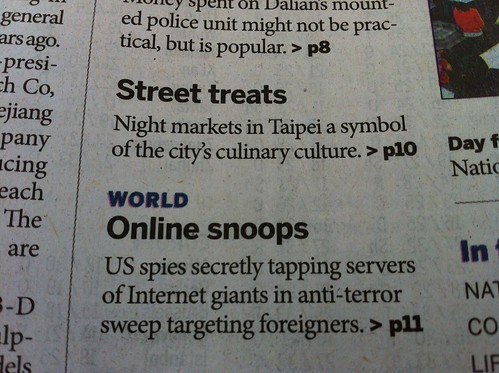Like I was saying, the People’s Republic of China is a strange place to be when a spying scandal breaks out stateside. On Friday, as Americans started talking about the NSA revelations, I was traveling around Shanghai with a friend who spoke Mandarin more or less fluently. I suggested that it would be fun to get the occasional man-on-the-street spin on what the NSA was doing.
“Oh, I’m sure that’ll come up,” said my friend.
He was being sarcastic. Any ambitions of writing a “China street” piece to make Tom Friedman proud were dashed by the vast majority of people not really caring about the story. Even the English-language official paper, China Daily, soft-pedaled the story, printing an AFP take near the back of the news pages.
 The Chinese state holds a whip hand when it comes to foreign journalists poking around the country. To get in I had to convince a consulate that I wasn’t reporting on China, despite my day job. And I wasn’t; I was just curious what the Chinese thought of an American story. (Hence the lack of names in this post.) The Chinese expect a certain level of scrutiny of their communications and media consumption. American social media like Twitter and Facebook are blocked. You can only sign up for Weibo, China’s version of Twitter with nearly 400 million users, after providing your real name and contact info. And the government can block search terms, as people noticed when the anniversary of a certain 1989 public demonstration came last week.
The Chinese state holds a whip hand when it comes to foreign journalists poking around the country. To get in I had to convince a consulate that I wasn’t reporting on China, despite my day job. And I wasn’t; I was just curious what the Chinese thought of an American story. (Hence the lack of names in this post.) The Chinese expect a certain level of scrutiny of their communications and media consumption. American social media like Twitter and Facebook are blocked. You can only sign up for Weibo, China’s version of Twitter with nearly 400 million users, after providing your real name and contact info. And the government can block search terms, as people noticed when the anniversary of a certain 1989 public demonstration came last week.
So the few people I encountered with opinions of the NSA story gave it a shrug. One engineer I met at a restaurant sounded surprised that Americans would be surprised. “We’re used to scrutiny here,” he said. “This is a big country, and people want to happy life in a country that’s stable.”
How did censorship and monitoring make that work? “If you’re not monitoring people, they can say whatever they want. They can spread misinformation.” I regaled him with facts about the conspiracies millions of Americans believe, about Barack Obama’s birthplace or the Kennedy assassination, and I felt an unfamiliar sensation—a sort of pride in how Americans can say anything online, anything that embarrasses them, and not think about who’s reading.
“If You’re Not Monitoring People, They Can Say Whatever They Want.’
Advertisement